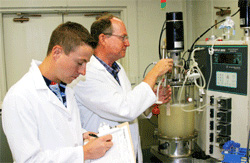Two University of Maryland scientists believe a strain of bacteria that decomposes everything from algae to newspapers to crab shells could help produce cheaper fuel. Found on marsh grass in the Chesapeake Bay, this organism could soon be used to generate ethanol from cellulosic sources such as waste paper, brewing byproducts, leftover agriculture products, including straw, corncobs and husks, and energy crops such as switchgrass..
 A process using the bacteria, developed by University of Maryland professors Steve Hutcheson and Ron Weiner, is the foundation of their incubator company Zymetis. When fully operational, the Zymetis process could potentially lead to the production of 75 billion gallons a year of carbon-neutral ethanol.
A process using the bacteria, developed by University of Maryland professors Steve Hutcheson and Ron Weiner, is the foundation of their incubator company Zymetis. When fully operational, the Zymetis process could potentially lead to the production of 75 billion gallons a year of carbon-neutral ethanol.
The bacterium is called Saccarophagus degradans, which translates as “sugar eater,” because it has the largest known concentration of enzymes that eat carbohydrates.

